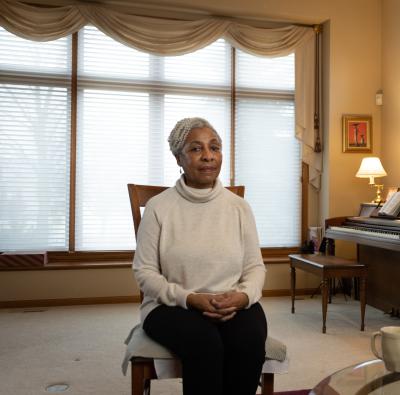All eyes are on Tennessee this week following the expulsion of two democratically-elected state house members, representing approximately 130,000 Tennesseans in Nashville and Memphis, the state’s most diverse cities.
Both the ousted legislators are young, Black men. The move raises serious concerns about the Legislature’s racial motivations and...
Campaign Legal Center has sent a letter to the Judicial Conference requesting that it exercise its power under federal law to refer Supreme Court Justice Clarence Thomas to the U.S. Attorney General for willfully failing to disclose gifts of free travel that he has received for over twenty years. If it is found that he intentionally violated the...
Voters in the United States have the right to cast their ballots freely, safely and privately through a secret ballot.
The modern conception of a “secret ballot” originated in Australia and was initially adopted in the American electoral system during the 1888 presidential election. By allowing voters to keep their ballots secret, they could make...
To maintain a government of, by and for the people, we must ensure that executive branch officials are using their power to benefit the American public, not their own financial interests. This is why we have laws to ensure that there is transparency and accountability when these officials play the stock market. But those laws are not always...
It’s no secret that leadership PACs have long been a source of abuse in our campaign finance system. These committees were first permitted more than forty years ago to enable federal officeholders and candidates to raise money to support congressional colleagues and gain support for their efforts to secure leadership roles. But in recent years...
On March 7, 2021, President Biden issued Executive Order 14019 Promoting Access to Voting. directing all federal agencies to evaluate opportunities to increase access to registration and ballot access, and to develop strategic plans to achieve these goals.
On the 58th anniversary of Bloody Sunday, and two years after President Biden issued this...
On Bloody Sunday, televised violence against civil rights activists in Selma, Alabama caused a national outcry and mobilized Congress to pass the Voting Rights Act. Fifty-eight years later, the State still has a long way to go to ensure Black Alabamians have equal access to the ballot box.
For decades, the Voting Rights Act served as a powerful...
Florida Governor Ron DeSantis is reportedly rolling in campaign cash, having raised over $70 million through his state PAC “Friends of Ron DeSantis,” and he will surely raise millions more before he formally acknowledges what is already apparent – that he will run for president in 2024.
DeSantis, who was just reelected governor of Florida by a...
The newly-elected Congress is the most diverse in history, but it falls far short of mirroring the breadth of diversity we have in this country. Revising a problematic campaign finance regulation could help improve our representative democracy by reducing the de facto personal wealth requirement for seeking elected office.
While the U.S...
The Supreme Court of the United States has released its final investigation report of last year’s leak of the Dobbs. v. Jackson Women’s Health Organization decision. This monumental breach of the Court’s confidentiality was handled with a conspicuously flawed investigation that yielded—surprise!—an inconclusive result. With this first major public...
Yesterday, the Senate Ethics Committee (“Ethics Committee”) released its annual report for 2022, revealing that it dismissed nearly all its ethics investigations and only issued one private letter of admonition as a penalty. In response, CLC sent a letter to Chairman Chris Coons (D-DE) and Vice Chair James Lankford (R-OK), calling on them to end...
As President Donald Trump demanded vote recounts and filed lawsuits across the country to challenge the results of the 2020 presidential election, he raised millions of dollars to help finance his efforts. But he ultimately spent several million dollars that he raised during this period on something completely unrelated, and his actions illustrate...
Voters have a right to know who’s spending money to influence elections. That’s why federal campaign finance laws require people running for public office to declare their candidacy and file reports that disclose who their donors are and how they spend campaign funds, including political contributions.
Federal law also prohibits super PACs —...
Kevin McCarthy became Speaker of the House of Representatives — one of the highest roles in our government and second in line to the Presidency — in a dramatic five-day, fifteen-round marathon of votes that highlighted the stark, rancorous divisions in his caucus.
Largely overshadowed by the drama of McCarthy’s bid to become Speaker was a...
CLC has joined a letter urging Congress to strengthen and codify into law the U.S. Office of Congressional Ethics (OCE). The letter asks not only for OCE to be codified into law, but also strengthened by giving OCE the power to subpoena witnesses during investigations.
OCE is an independent watchdog that provides vital nonpartisan oversight and...
When campaigning for public office, federal candidates have to be honest with the public about who is giving their campaign money. Transparency regarding the sources of election spending is vitally important to our elections, as complete and accurate information about who is spending money to back candidates empowers voters to more meaningfully...
Late last year, Congress delivered a major victory for democracy by passing the Electoral Count Reform Act of 2022 (ECRA). This bipartisan legislation, included as part of an omnibus appropriations and policy package, updates the archaic Electoral Count Act (ECA) of 1887. The ECA, as updated by the ECRA, provides the primary legal framework for...
Campaign Legal Center (CLC) recently endorsed the TRUST in Congress Act, a bipartisan bill reintroduced by Reps. Abigail Spanberger (D-VA) and Chip Roy (R-TX). The TRUST in Congress Act would prohibit members of Congress from trading individual stock while in office by requiring members to put their holdings in a qualified blind trust or divest.
...Representative George Santos has a lot of people to answer to. First and foremost should be his constituents, the voters of New York’s 3rd Congressional District, who were deliberately deceived regarding critical personal and financial information about the candidate on their ballot.
Voters have a right to the information they need to make...
CLC and 24 partners sent a letter to the full U.S. House of Representatives, urging members to remove two proposed House rules for the 118th Congress that would weaken the U.S. Office of Congressional Ethics (OCE), the only independent ethics investigative body in Congress.
OCE’s core function is to provide independent, nonpartisan oversight to...
In a major victory for democracy, Congress passed the Electoral Count Reform Act of 2022 (ECRA). This vital legislation will update the Electoral Count Act of 1887 (ECA), an archaic law that provides the primary legal framework for casting and counting Electoral College votes in presidential elections.
Congressional passage of the ECRA is crucial...

